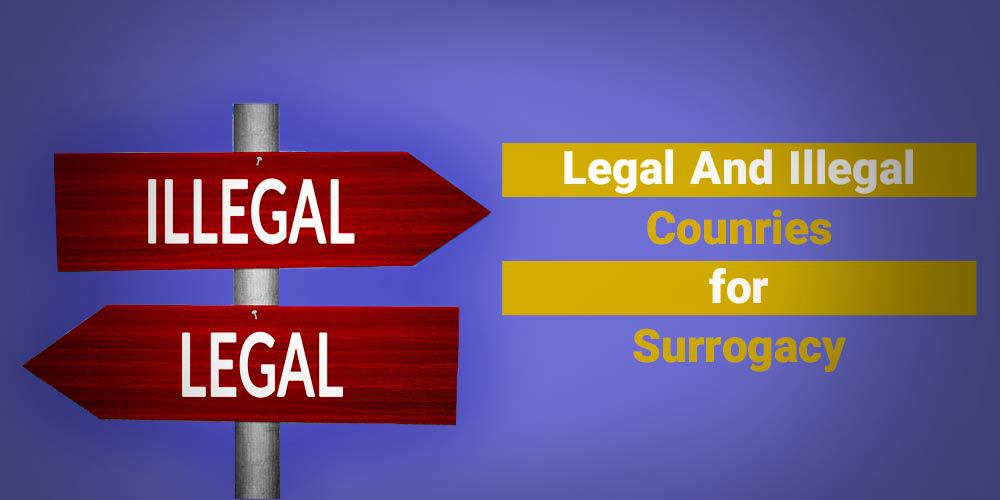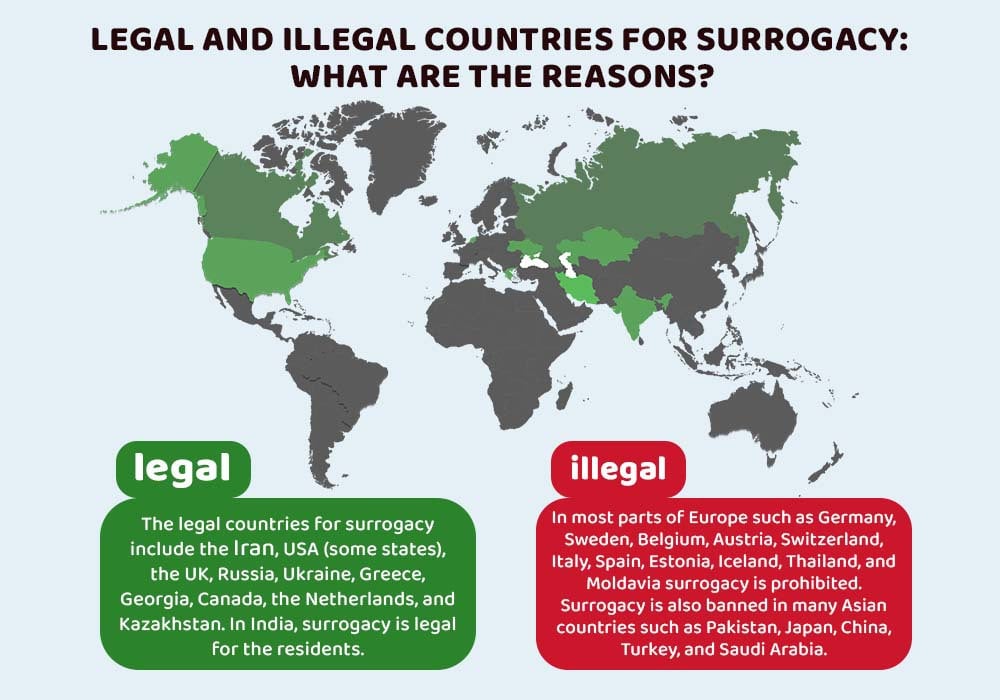
In this article, we classified countries into three categories: legal countries, restricted countries and illegal countries for surrogacy. Keep this in mind that these laws can always go through some changes as the time passes. Consult with an experienced surrogacy lawyer first when you want to choose a country for undergoing surrogacy process.

 Surrogacy is allowed in the countries where an explicit law supports this kind of fertility treatment. The favorable law should clearly establish the requirements and conditions for performing the process like the types of families who can use it, intended parents and surrogate’s rights and obligations, parentage establishment, etc.
Surrogacy is allowed in the countries where an explicit law supports this kind of fertility treatment. The favorable law should clearly establish the requirements and conditions for performing the process like the types of families who can use it, intended parents and surrogate’s rights and obligations, parentage establishment, etc.
Surrogacy is a challenging and complicated process. It is very important to rely on a trustworthy and professional surrogacy agency to make sure all the works are in control and well-managed. Also, there are various surrogacy costs all over the world that should be considered according to your budget before starting.
Surrogacy in Iran Legacy Legal Cost 21,000$ (needs more consultation) Anesthesia No Hospital Stay Zero day Minimum Stay in Iran 3 to 4 weeks
In some of them, surrogacy is prohibited for foreign applicants and it is only available for local residents under special circumstances which make international surrogacy impossible. One of the examples is India where only Indian people can perform the process. In the other countries like Australia or European Union countries, compensated surrogacy is not allowed and people can only try altruistic surrogacy which means the intended parents and the surrogate should avoid any economic relations for the surrogacy process.
If you are considering international surrogacy, you seriously should be aware of all the probable restrictions in the destination country. You have to make sure your condition fits all the necessary requirements in order not to waste your time and money. However certain surrogacy restrictions may make the process even safer. You have to consult with an experienced lawyer and then decide which destination is the best for you.
 Finally, there are some countries in which surrogacy is completely forbidden because of religious, moral or legal reasons. Although surrogacy may have been legal in these countries in the past, inability to regulate them may have ended to outlaw it completely instead of trying to make a legal and practical structure for it. In most parts of Europe, surrogacy is an illegal process. These are the countries where you cannot address them as the surrogacy bases in the world: Bulgaria,Portugal, Spain, Italy, Ireland, Germany, France, Switzerland, Denmark, Norway, Sweden, Iceland, Estonia, Moldavia, Turkey. This prohibition even exists in some USA states in spite of its popularity as one of the best countries for surrogacy arrangements. New York, Arizona, Michigan, Indiana, and North Dakota are some of the states where surrogacy and those who participate in it are punishable by law. They may be imprisoned or subject to pay a fine This restriction also exists in Mexico except two states of Tabasco and Sinaloa that allow surrogacy for the local people. In the past, foreign candidates had the permission to undergo surrogacy in Mexico but after 2015 the access for international surrogacy has been banned. Therefore, these are not countries to be considered as a surrogacy destination. Regardless of where your selected country is, ensure that you know the whole surrogacy law in that country in order not to face a problem during the process. As mentioned before, while this article offers a general view toward surrogacy destination, you should speak to an experienced well-informed lawyer before taking any actions.
Finally, there are some countries in which surrogacy is completely forbidden because of religious, moral or legal reasons. Although surrogacy may have been legal in these countries in the past, inability to regulate them may have ended to outlaw it completely instead of trying to make a legal and practical structure for it. In most parts of Europe, surrogacy is an illegal process. These are the countries where you cannot address them as the surrogacy bases in the world: Bulgaria,Portugal, Spain, Italy, Ireland, Germany, France, Switzerland, Denmark, Norway, Sweden, Iceland, Estonia, Moldavia, Turkey. This prohibition even exists in some USA states in spite of its popularity as one of the best countries for surrogacy arrangements. New York, Arizona, Michigan, Indiana, and North Dakota are some of the states where surrogacy and those who participate in it are punishable by law. They may be imprisoned or subject to pay a fine This restriction also exists in Mexico except two states of Tabasco and Sinaloa that allow surrogacy for the local people. In the past, foreign candidates had the permission to undergo surrogacy in Mexico but after 2015 the access for international surrogacy has been banned. Therefore, these are not countries to be considered as a surrogacy destination. Regardless of where your selected country is, ensure that you know the whole surrogacy law in that country in order not to face a problem during the process. As mentioned before, while this article offers a general view toward surrogacy destination, you should speak to an experienced well-informed lawyer before taking any actions.
If you want to experience high-quality medical services, equipped facilities and affordable prices, doing surrogacy in Iran is one of the best choices that you can ever have.
If you need more information on this topic and want to consult, contact us NOW.
The consultant medical doctors of TebMedTourism Co. are at your service for free.


Comments & Questions